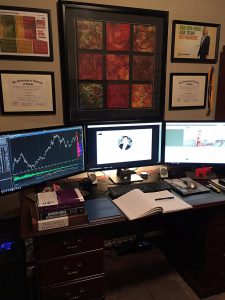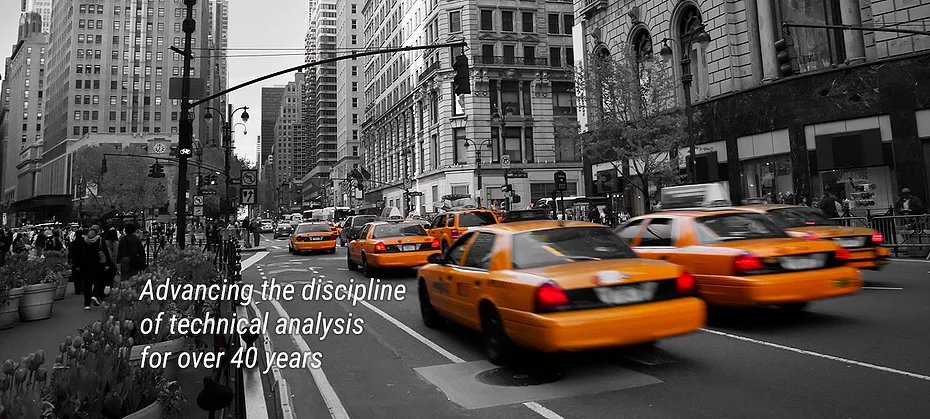When I first saw the tweet from JC Parets, CMT some weeks ago that he, along with the Market Technicians Association would be putting on a virtual conference in technical analysis, I made sure to clear my schedule. As I begin my prep for the final exam of the CMT Designation, there was no better way to get a jump start on that process than to listen to some of the most well respected practitioners in our industry. I first started following JC years ago after hearing him speak at the (2012?) NYC Trader Expo.
Back then, I was more of a fundamental “trader” if there is such a thing. Basically, I was spending a lot of time memorizing CAPM, time value of money equations, and learning more than I ever wanted to know about balance sheets and cash flow statements. For what interests me the most, it wasn’t quite the right fit. I wanted to learn the discipline of technical analysis but wasn’t sure where to start so I headed to NYC from Omaha for the first time and sat in on several speakers whose approach to money management was rooted in technical theory.
For a kid from small town Nebraska, New York City energized me in a way that had a lasting effect for months to come. I have gone each and every year since 2012. I sometimes feel bad for people that are from NYC as they most likely won’t ever know that feeling. It’s just home to them. For me in my 20’s, it was as if a whisper made its way through the noisy streets and into my ear. “Hey kid, it took you a while but you found it. Welcome home.” The rest is history, I suppose you can say.
Fast forward 5 years and here we are. A look at my Friday night. 🙂

I thought I would put some rough notes together as takeaways from each of the speakers throughout the entire conference. I may go back in the coming weeks or months and add to this, or if someone else has notes they’d like me to add let me know I am happy to do it. I HIGHLY recommend if you are interested at all in investments, trading, money management, psychology, economics, or just like to learn get here tomorrow:
JC Parets, Host (All Star Charts)
In a strange way JC may be somewhat responsible for me deciding to pursue technical analysis as he was the first true technician I heard speak at the Trader Expo back in 2012. Admittedly, at that point I had no idea what the hell he was talking about 80% of the time. I was brand new to looking at charts and was on the quest for the ever evasive “Holy Grail” system that would print money. Of course once you learn that it doesn’t exist, you realize the amount of work you will need to put in to begin to understand the language of TA. JC was so far over my head, but his talk on Intermarket Analysis still sticks out in my head today. Relative strength is something I use everyday and have read every one of John J. Murphys books. I have read every blog on JC’s site for 5 years and bought all of the books on his must read list. He has always been kind enough to answer emails over the years as I’ve progressed though “JC what the hell is a Fib Retracement, to JC what the hell is a ratio chart.” Thank you for being one of our voices in TA and through the MTA and I look forward to reading your insight for years to come.
I think I first saw Josh on Fast Money about the time his first book BackStage Wall Street was released. I have read that book a couple of times as well as his newer one. He can always be counted on to convey his thoughts on the markets in a no nonsense way via CNBC, Twitter and his blog. Some of my takeaways after listening to Josh…
– At the end of the day price is what matters.
– To accomplish the goals of our clients, you have to answer the question – “How do I put this money to work?” Technical analysis plays a big role in that.
– In his firm’s Goaltender model, they use a TA approach exclusively. A tactical model can’t count on lagging economic indicators or valuation.
– TA helps in reminding us that price action is ultimately what pays. “Coke may be a great company with good management, but the stock might not go up.”
– There are a larger number of asset managers applying a rigorous, objective version of technical analysis and quant methods.
– TA helps in the systematic rebalancing of of portfolios. It is easy to see on a chart that foreign markets have underperformed US markets on a relative basis, so new money being put to work needs to be allocated accordingly.
– If all investors and money managers incorporated technical analysis to a greater extent, they would be better investors and risk managers. Our job is to put client’s money in markets where it will be treated well and TA gives us a great chance to do that.
Phil Pearlman (Bank of the Ozarks)
– Define your objectives. Know your exit plan before you get in any trade.
– Price behavior is hugely affected by psychology.
– It has been empirically validated through behavioral economics that humans are wired to be poor investors. We are loss averse, hold losing trades too long and cut winners too soon.
– There are definite emotional and psychological underpinnings to our investment actions.
– Self awareness, adaptability and receptive to learning can aid our poor makeup for investment success.
– “There is no Viagra for the cure of irrational market behavior.”
– Be adaptive, willing to learn from mistakes and plan ahead of time for intensely emotional situations.
– Healthy body, mind, spirit, and self awareness are crucial in investment success. Physical and mental shape play a role in investment success.
– Keep a diary. Write down how you feel after putting on a trade, how you feel after a win, after a loss, document everything in notes, a blog or somewhere you can reference later.
– All levels of market participants need to be in good mental and physical shape to optimize your performance. The lazy traders don’t make it and so what is left are the highly skilled and that is who your competition is. Don’t put yourself at a disadvantage by being in a bad place mentally.
– Keep the noise out, focus on what YOU are are capable of or what you do best, and hone that skill to become an expert at one thing. Don’t try and do it all, do what you can do great 99% of the time and success will come in the markets and in life.
Howard Lindzon (Stocktwits / Wallstrip / All Around Badass)
– Getting good at “Chart Art” is being able to see people’s behavior at a snapshot in time.
– Putting yourself out there expanding your horizons. Don’t stick to a strategy that doesn’t mesh with your DNA.
– Enjoy the present but live in the future as much as I can. Stocks help me to think about other private companies from an angel investing standpoint.
– Paying it forward. How can we cut something that was once a 10 year learning curve into something that may take 3-5.
– Invest in stocks and startups until 70-80 years old, very few millennials are investing, they are in cash not taking advantage of time and compounding.
– Learn the language of the markets by whatever means necessary over 5-7 years and it will pay huge dividends over the course of your lifetime. Much more than a medical degree would for example.
– Personally is heavily invested today. Hasn’t held this many stock positions since 1999. Breadth is good but it is prudent to take some off as we make highs and exercise discipline.
– Bullish Asian Fintech and payments. Ten Cent Company. Bullish on banks in 2017.
Tyler Wood (Market Technicians Association)
Tyler shared some great slides I am going to request permission to share before I put them up. If he allows I will add them later this weekend as I don’t want to violate copyright for the MTA.
I will continue to update this for the speakers throughout the weekend and into next week. If you would like anything added, changed for content or removed just email me through the blog or at [email protected]
Thanks!
